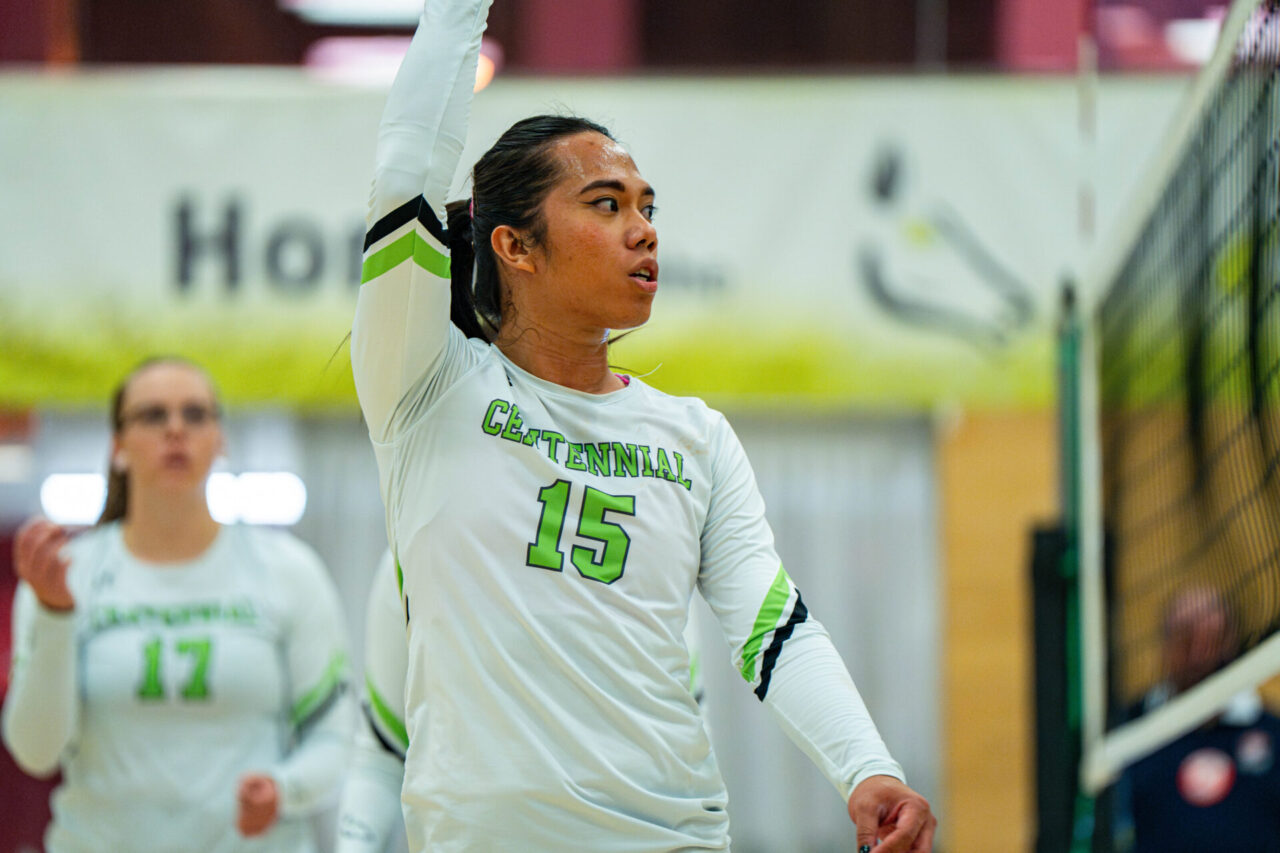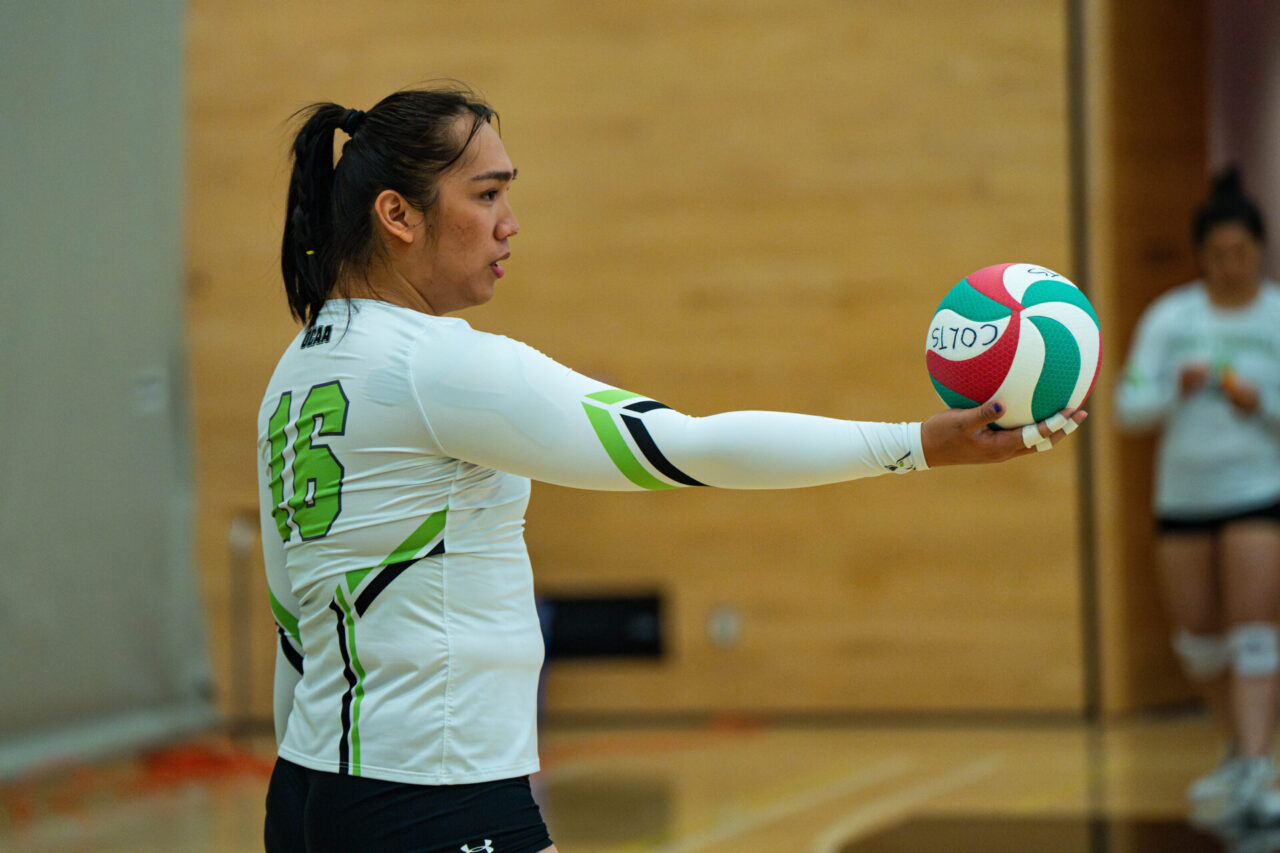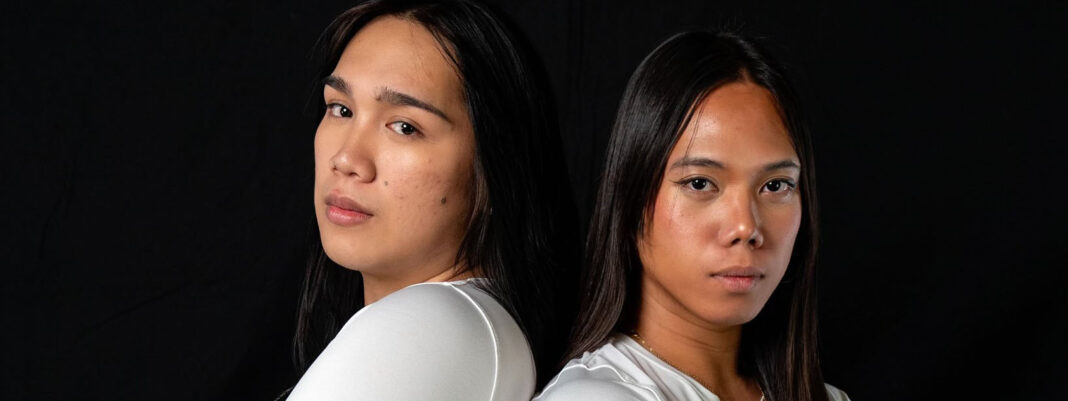By Isabelle Ferrante
Amid the heated years-long rivalry between the George Brown Huskies and Seneca Sting, two opponents, Jaque Maria Ronquillo and CL Viloria, both transgender, found themselves going face-to-face on the court during an emotional and high-intensity preseason game during the OCAA’s COVID (2020-21) season. One year after they initially met, Viloria visited Ronquillo at one of her games and met up with her after the match. It was in that proper meeting that they knew their connection was special. What started as an unexpected encounter soon blossomed into a genuine friendship, founded on the shared passion for the game of volleyball and experience as trans athletes.
This year, that friendship got even stronger when an idea became a reality, and they joined the Centennial Colts volleyball team together. They had always joked that one day they would play on the same team, but when Ronquillo saw the opportunity, she brought up the conversation in a more serious tone at one of their many sleepovers.
It took just two yeses for them to pull the trigger and make the tough decision of leaving their respective schools to join forces. They knew there was going to be some backlash from their teams, which there was, but that wasn’t going to stop them from making their dreams come true.
And now that they are on the same team it’s not only helping them grow as athletes but as friends.
“I feel like I have someone that I can relate to. I’m not saying no one relates to me but it’s still different when there’s someone that is like you,” Ranquillo says.
“Playing wise, it’s nice to have her tell me if I’m doing good or not, or step up my game and that really helps me to play better because she’s with me. I have the pressure to always keep up with her.”
Viloria, says Ranquillo, is like her big sister.
“I feel more at ease. There’s someone who understands me more. I always open up to her. She knows what I’m feeling like, she’s been through there, and she has more experience with volleyball and being trans.”
As a 9-year-old boy growing up in Manila, the capital city of the Philippines, Ranquillo fell in love with volleyball after watching a women’s team play. Wanting to do the same, he asked his dad if he could play but was told to play on a men’s team until Ronquillo was 18.
“I’ve never pictured myself playing with men, ever, but I was forced to because, in the culture that I grew up in, it’s forbidden for you to play with the gender you identify as,” she says.

When Ranquillo was told that she couldn’t play with women because she wasn’t biologically female, she had no choice but to accept it. She wanted to learn the sports and to have her skills polished, but she had to give up the reality of living her true self.
“It (playing with men) taught me how to be aggressive, but then again, it didn’t give me a sense of belonging, and that was always the one thing that was missing,” she says.
She finally started taking hormones, three years before going to George Brown College.
Her journey to the OCAA is very similar to Viloria’s which has led them to bond.
Viloria also started her volleyball career as a young boy in the Philippines. She started playing in and gaining experience through extramural teams. That all changed when she got to high school and moved to Canada.
Wanting to continue her volleyball career, Viloria had to try out for the men’s team despite fully knowing she wanted to be the person she is now. And although she made the team, she didn’t have a sense of belonging just like Ranquillo.
“I enjoyed it for a little bit. But then, as it went by, it made me uncomfortable being with the guys. They didn’t even hide it. So after that, I just quit the team,” Viloria says.
I’ve never pictured myself playing with men, ever, but I was forced to.
Jaque Ronquillo
That feeling of being uncomfortable is not uncommon for LGBTQ+ youth in sports. According to a report by The Canadian Centre for Ethics in Sport (CCES) titled Power of Sport: The True Sport Report 2022, 81 per cent of Canadians have witnessed or experienced homophobia in sport. They went on to say, “Of Canadians, 70 per cent believe youth team sports are not welcoming or safe for gay, lesbian, and bisexual people.”
The numbers are very concerning because, according to a 2023 study by JAMA Pediatrics, “research has demonstrated that physically active youths have improved mental health outcomes, greater self-esteem and social supports, increased school retention rates, and lower risks for chronic disease and teenage pregnancy,” the authors wrote, noting their concern that the bans could contribute to “lasting deterioration of the physical and mental health of this at-risk population.”
Recently, the OCAA has taken a step forward in the direction of being more accepting with a change to an old policy, a policy that had affected both Villoria and Ronquillo.
Viloria began hormone replacement therapy after consulting a doctor and getting her parents’ support, which was also after she started school at Seneca College. She had been on her medication for four months when she tried out for the Sting and made an impression on the coaching staff.
Despite that, Viloria was told she may not be able to play due to the Canadian Collegiate Athletic Association’s (CCAA) transgender policy, which required transgender athletes to have completed hormone replacement therapy for at least one year.

However, in 2021, Seneca joined Ray Chateau, Director of Athletics and Recreation at Humber, who had a similar case, in an appeal to both the OCAA and the CCAA to have the transgender policy updated to be more inclusive.
With unanimous support from the OCAA, the appeal process was expedited at the CCAA, and changes were made at a special meeting held in January 2022.
The policy now states, “Student-athletes may compete on the sports team that corresponds with either their sex assigned at birth or their gender identity, provided that at all times, student-athletes comply with the Canadian Anti-Doping Program. Student-athletes may only compete on sports teams of one gender during a given Academic Year.”
Recently, policies regarding trans folks in sports have been majorly controversial. Swimmer Lia Thomas became the first openly transgender athlete to win America’s top trophy in university sports and has been in the limelight because of it. She became a lightning rod in the debate about trans women in sports.
The main argument has been the biological advantages transgender athletes have over cisgender athletes but Joanna Hoffman, director of communications for Athlete Ally, believes it’s not a fair assessment.
“Every single transgender athlete is different. So many of the studies that have been used to justify bans don’t even have, didn’t even study or look at data around trans athletes, they were comparing cisgender men and cisgender women, which has nothing to do with transgender athletes,” Hoffman says.
In 2021, the CCES commissioned E-Alliance to complete a review of scientific and grey literature on transgender athlete participation in competitive sports. They said available evidence indicates trans women who have undergone testosterone suppression have no clear biological advantages over cis women in elite sports.
“If you talk to athletes across sports, especially these sports that require so much, so much individual dexterity and agility and also strategic planning around how to be a good athlete, they will tell you being transgender doesn’t give someone an inherent advantage,” Hoffman says.
“It just doesn’t even make sense because every single athlete is different. Every single person’s body is different. Everyone has different levels of access to training nutrition, to equipment that make them stronger athletes in different ways.”
Every single transgender athlete is different.
Joanna Hoffman, Athlete Ally
Many places in the United States and around the world have now started to backtrack on their stance on accepting trans athletes in certain sports by straight-up banning them.
In April of this year, the U.S. House of Representatives passed H.R. 734, a federal bill that mirrored legislation that had already been adopted by nearly half of the U.S. states. The bill declared that it was a “violation of Title IX” to “allow individuals of the male sex to participate in programs or activities that are designated for women or girls.”
“It’s so devastating to see the way these bans are just being carelessly introduced in state legislatures. It’s just depriving trans kids of the right to exist in public life and the right to thrive through sports like their peers can,” Hoffman says.
That’s the reason why every time Ronquillo and Viloria step on the court together they feel that their presence is a statement to everyone that they deserve to be there, and are inspiring future OCAA trans athletes to play with the same passion they have for the game.
“It’s important for us to build an image of us playing at a high level so that people will be encouraged to be like us, student-athletes to actually excel at both academics and sport,” Ronquillo says.

